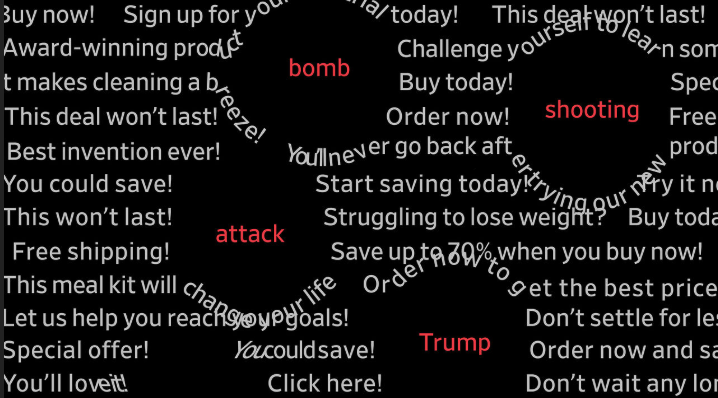An increasing number of companies are now demanding that their online advertisements do not appear next to articles containing ‘blacklisted’ keywords, according to the Wall Street Journal‘s Suzanne Vranica.
For example, articles which contain the words “dead, shooting, murder, gun, rape, bomb and Trump” have been flagged as no-go, according to brand-safety firm Integral Ad Science.
Like many advertisers, Fidelity Investments wants to avoid advertising online near controversial content. The Boston-based financial-services company has a lengthy blacklist of words it considers off-limits.
If one of those words is in an article’s headline, Fidelity won’t place an ad there. Its list earlier this year, reviewed by The Wall Street Journal, contained more than 400 words, including “bomb,” “immigration” and “racism.” Also off-limits: “Trump.” –Wall Street Journal
In recent years, corporations have been burned after their online advertisements appeared next to offensive content – including fake news, porn, and hateful or racist materials. This can happen due to the way ad serving agencies categorize audiences vs. content. As a result, advertisers are now stipulating that they don’t want their content featured on certain websites or articles with certain keywords.
“Political stories are, regardless of party affiliation, not relevant to our brand,” a Fidelity spokesman told the Journal in a statement, adding that the company also avoids several other topics which aren’t in alignment with their values.
That said, blacklists are not new to the advertising industry – such as airlines avoiding articles dealing with airline crashes. They are, however, becoming far more complex, specific, and extensive according to ad executives.
The ad-blacklisting threatens to hit publications’ revenue and is creating incentives to produce more lifestyle-oriented coverage that is less controversial than hard news. Some new organizations are investing in technologies meant to gauge the way news stories make readers feel in the hopes of persuading advertisers that there are options for ad placement other than blacklisting.
Consumer-products company Colgate-Palmolive Co. , sandwich chain Subway and fast-food giant McDonald’s Corp. are among the many companies blocking digital ad placements in hard news to various degrees, according to people familiar with those companies’ strategies. –Wall Street Journal
Some of the blacklists are so restrictive that nearly all political or hard-news stories are off-limits.
“It is a de facto news blocking,” said ad-buying executive Megan Pagliuca.
The use of lengthy keyword lists “is going to force publishers to do lifestyle content and focus on that at the expense of investigative journalism or serious journalism,” said Nick Hewat, commercial director for the Guardian, a U.K. publisher. “That is a long-term consequence of this sort of buying behavior.” The Guardian has had some advertisers block words such as “Brexit,” he said. –Wall Street Journal
And according to ad measurement firm DoubleVerify, out of 177 advertisers they work with, there has been a 33% increase in blocked ads based on blacklists vs. one year ago, and more than double the number in 2017, according to the company.
Meanwhile, advertising firm Integral Ad Science, which ensures that ads run on advertiser-safe content, said that “of the 2,637 advertisers running campaigns with it in June, 1,085 brands blocked the word “shooting,” 314 blocked “ISIS” and 207 blocked “Russia.” Almost 560 advertisers blocked “Trump,” while 83 blocked “Obama.””
Amid the American political divide, advertising has become a new crusade for weaponized activists. For example, the Twitter account Sleeping Giants called out hundreds of companies advertising on right-wing news site Breitbart News – resulting in a widespread blacklisting.
Colgate-Palmolive is blocking online ad placements in news stories, according to people with knowledge of its ad strategy. “In general, our media buying goals are to advertise where people are most likely to be receptive to what we have to say,” a Colgate spokeswoman said in an email. The company said it looks for “opportunities more likely to fit with the brand’s positive, optimistic message.”
Subway said it has blacklisted 70,000 websites, including most hard-news outlets. The company wants to align with “positivity and the moments when our guests will be most likely to consider getting Subway,” said Melissa Sutton, Subway’s director of media services.
Used-car retailer CarMax Inc. blocks online ads it purchases through automated systems from appearing next to news content in categories such as “disasters,” “extreme violence” and “inflammatory politics” to ensure the integrity of its brand, the company said.
McDonald’s currently is blocking hard news from its automated ad purchases in the U.S., according to a person familiar with its ad buying. “The first time your brand is damaged, it’s not easily fixed,” said Bob Rupczynski, senior vice president of marketing technology at McDonald’s, during a recent ad conference in Cannes, France. –Wall Street Journal
That said, despite keyword blacklists, advertisers may not be able to avoid some embarrassment. In February, a spate of advertisers including AT&T and Nestle SA pulled ads from YouTube after their content was featured over a “soft-core pedophilia ring” which allowed pedophiles to identify videos of young girls engaging in sexually suggestive activities.
Read the rest of the report here.
via ZeroHedge News https://ift.tt/2THmJCA Tyler Durden

